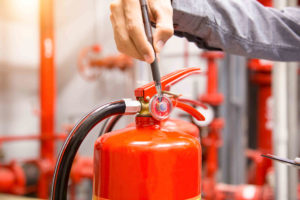
Electrical-related problems are prevalent reasons for non-compliance in a fire safety inspection.
U.S. fire departments perform regular fire safety inspections to analyze possible fire and life-safety hazards in buildings in their jurisdiction. Although inspections differ in type and frequency per city, the business or property owner wants to avoid unexpected repairs or a failed test. Judd Fire Protection provides the main reasons why a commercial property will fail its fire safety inspection to ensure you receive a passing grade and avoid any unnecessary expenses.
Blocking the Emergency Responder Access
There are checklist items on the fire safety inspection that must be addressed to ensure emergency-response personnel can complete their jobs effectively during a fire. In fact, national codes now require that buildings enable fire departments safe and quick access. So, your commercial building’s address must be clearly visible from the road. Also, there should be no restriction for emergency responders to access the building in specific ways.
In addition, the fire department connection that enables the fire department to supply water to a standpipe or sprinkler system must be clearly visible and accessible. Additionally, all fire hydrants should be visible and accessible.
Not Maintaining the Means of Egress
Maintaining the means of egress is crucial to offering proper life safety in your building. Ensuring all exit doors are constantly accessible and open properly is critical. You also want to make sure that fire-rated areas like stairways have features such as releasing mechanisms that have been appropriately installed and are functioning. Also, only store combustible materials in any portion of the means of egress; no storage can minimize the necessary width or block exits.
Electrical-Related Issues
Electrical-related problems are prevalent reasons for non-compliance in a fire safety inspection. As a business or property owner, you must adequately label all circuits on all electrical panels and clear access of 30 inches in front of all electrical panels. Plus, all extension cords are not allowed except when it’s used for temporary power. Remember that all extension cords must be in good condition, heavy-duty, and for minor appliances.
Having Combustible Materials
You must also store combustible materials away from flame-producing appliances and at least 18 inches below the fire sprinklers. In addition, any flammable or combustible liquids should be in approved containers and storage cabinets. Overall, Judd Fire Protection will be a valuable ally for you to pass your fire safety inspection.
Commercial and Residential Fire Prevention from Judd Fire Protection
If you want to ensure your home and business are safe throughout the year, trust Judd Fire Protection, LLC. We have over two decades of experience designing, installing, inspecting, and repairing residential and commercial fire protection systems. We serve clients throughout Maryland, Pennsylvania, Washington, D.C., Virginia, and West Virginia. If you are interested in finding out more about our services and protecting your home and business, give us a call at 410-871-3480.
